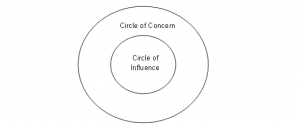Get the Habit – Habit 1- Be Proactive
The first in a series of 7 personal development articles based on the key messages from Stephen Covey’s ‘The 7 Habits of Highly Effective People’.
This Habit is an important starting point as all the other Habits depend on it – essentially Proactivity is about having a ‘can do’ attitude to making things happen.
The underpinning message is that as human beings we have CHOICE – the choice to decide how we respond to the events and situations that we are presented with on a day to day basis.
A person exhibiting the Proactive Habit is one who takes the initiative, accepts responsibility and recognises that their decisions ultimately impact on their lives. They realise that they have it within their power to make things happen.
A person in Proactive mode will use language that reflects their mindset – phrases such as:
- Seize the day
- Take the initiative
- Let’s get on with it
- Go for it
They will also put themselves in the driving seat of seeking solutions to problems. They recognise that life is what you make it and that you ‘Don’t get owt for nowt’ – ie you get out what you put in.
Conversely a person who is behaving Reactively has chosen to allow other things to control them – they wait for things to happen to them (often fruitlessly) and expect others to make the running. They are also quick to blame others or outside forces (such as the environment, government, economy, etc) for their own situation. You might hear them saying things like:
- There’s nothing I can do about it
- I’m waiting to see what happens
- He makes me so angry
- The weather ruined my holiday
A caution – not many of us will be completely Proactive or completely Reactive in our nature – and our approach can change dependent on the context (eg more likely to be Proactive at work and more likely to be Reactive in making social arrangements). In getting Habit 1 what we are attempting to do is shift the balance of our behaviour to Proactive, particularly in the situations which most impact our lives.
Stephen Covey introduces the idea of two circles: the ‘Circle of Concern’ and the ‘Circle of Influence’.
Think first about everything that goes on in the world around us – some things concern us and some things are of no concern to us. All those things that concern us are within our ‘Circle of Concern’ – eg health, World peace, the Economy, our family, the environment, personal finances, our job, colleagues, etc.
Now imagine that within our Circle of Concern there are things that we can influence and other things that we have no influence over – for example we may not be able to influence World Peace but we can influence the happiness of our family. We may not be able to change the way someone treats us but we can change the way we react to it. Our ‘Circle of Influence’ thus sits (usually) within our Circle of Concern.
People with the Proactive Habit, focus their energies in their Circle of Influence – working on the things that THEY can do something about.
So being Proactive is about taking the initiative, making things happen and concentrating your energies where you have the most chance of having an impact.
At the outset of this article I pointed out that underpinning this Habit is the concept that we have CHOICE – the choice to decide how we respond to events and situations. Difficult circumstances still arise – people behaving Proactively can still be hurt physically, emotionally or economically – what is different is that their attitude means that their basic identity is not damaged by these events. While we can decide how WE respond, we do not have control over the consequences of our actions. We might not get the result we want, we might make mistakes, we might upset others…what is important is that we LEARN from our actions and proactively use this in the future. Another phrase borrowed from NLP:
“There is no failure, only feedback.”
Actions
- Over the next day, notice the language you use and the response you make to situations – are you more Proactive or Reactive? Does it change in different contexts?
- Make a list of the things that are in your Circle of Concern and those that are in your Circle of Influence – notice where you place your mental and emotional effort and, if you are spending a lot of time in your Circle of Concern, pick something within your Circle of Influence to take some Proactive action on.
- Practice choosing your response to situations – particularly if you have identified a tendency to have Reactive responses. Note what happens and how this affects how you feel and the outcomes you get.
Access the other 6 Habits at the links below:
Habit 2 – Begin with the End in Mind (goals and vision)
Habit 3 – First things First (time management)
Habit 5 – Seek First to Understand (listening skills)
Habit 6 – Synergise (know your strengths and those of others)
The 7 Habits of Highly Effective People – Powerful Lessons in Personal Change by Stephen Covey (1989) is published by Franklin Covey Co ISBN 0-684-85839-8.

